Think about how nutty markets are right now. Meaning we are really Cuckoo for Cocoa Puffs here. We do not say this as a form of sour grapes: We did quite well in 2014 and are in the black for 2015 as of this writing. But objectively speaking, the activity out there is just bizarre, relative to the way normal-function, halfway “healthy” markets might appear. This is the dazed aftermath of a toxic medicinal cocktail…
Take Germany for example. The Germans just sold 5-Year notes at a negative yield for the first time, following Finland.
You now have to pay Deutschland to lend them your money at maturity of half a decade (Switzerland had already gone negative on the 10-Year). Why would anyone do this? Well, if you think deflation is coming, you might calculate that the cash you get back in 2020 will be worth more than the cash you are depositing today. But this is not just a German thing; Ireland 10-Year yields are now below one percent. The ECB is paying out a yield of negative 20 basis points and there are concerns that, with the “Euro QE” that is coming (to the tune of sixty billion euros per month), there will not be enough high quality sovereign bonds for the ECB to purchase.
Interest rates near zero or negative around the world would seem to imply a very dark economic forecast. There is little growth in Europe, and what little growth exists (e.g. German) is threatened by export currency wars and China slowdown. Yet the immediate focus is on QE and stimulus, not the awful message of global bond markets, so global equities are going near-vertical.
The bulls are partying like the economic and corporate profit outlooks, for Germany and elsewhere, are the best they’ve ever been. Either we are missing something big, or this is a distortion-driven delusion based on faith in central banks and risk appetite inspired by lambada rates. You would think Germany has a bright medium-term future going off the DAX: Yet in fact, the outlook is just horrible!
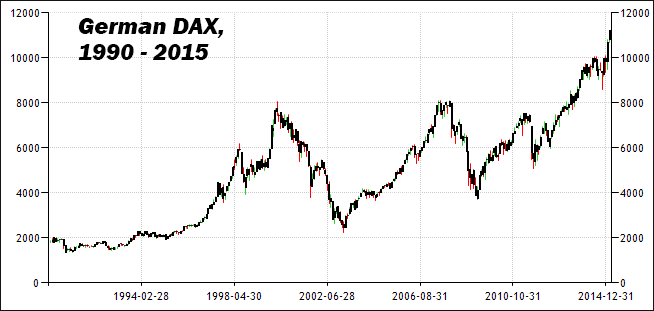
Why is the outlook horrible? Because, as an export power-house, Germany’s fortunes are inevitably linked to those of Japan and China, which means greater pressure from Japan (as currency wars intensify) and fewer orders from China as the dragon falters in slow-mo. On a broader level, Euro QE is likely to fail, and a perpetual “euro crisis” is only on hiatus.
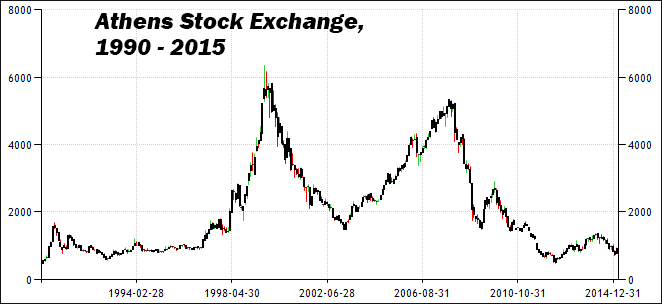
In comparison to Germany, where the DAX is achieving full lift-off into the stratosphere, the Athens stock exchange has round-tripped back to 1990 levels. The difference in outlook for the two markets is ironic, given the “Germany versus Greece” dynamic of the present crisis. In recent negotiations, Greece won a last-minute creditor reprieve as we expected. And yet Germany (on behalf of the euro zone’s creditor nations) was seen to have driven such a hard bargain, the optics suggested Syriza had left with its tail between its legs.
The German finance minister, Wolfgang Schaeuble, even had the incredibly bad taste and arrogance to gloat, saying that “The Greeks certainly will have a difficult time explaining the deal to their voters.” This was moronic on Germany’s part: Schaeuble should be reprimanded and reined in (if not fired outright). Why? Because, in the big scheme of things, the relationship between Europe’s creditors is like that between jailers and jailed. While the creditors “handled” Greece this time around, they did so in the manner of security guards using extra brutality to put down a revolt. The trouble (and stupidity) of this strategy is the fact that populist parties in Spain and Italy are watching… and learning… and developing the opinion that Germany and the creditor contingent are a bunch of bastards who must be dealt with in extremes.
It was widely seen as a strategic blunder for Tsipras and Varoufakis to voluntarily take a euro exit (“Grexit”) off the table so early, giving Germany a free hand to hardline them until the last possible second. If the Five Star movement in Italy or Podemos in Spain have learned anything from this, it is that, upon sweeping out the current pro-EU governments in upcoming elections, the stance to immediately take is “honor our demands or we dump the euro straightaway.”
And that will be an order-of-magnitude larger threat, by the way, coming from an Italy or a Spain. The current leaders in various periphery countries sided with Germany not Greece, leaving Greece isolated, because the rise of the populists is feared, and the current leadership has already embraced an austerity-accepting status quo. The populists will come strong anyway… and conservative periphery leaders will get thrown out, like the pre-Syriza contingent in Greece… and what will happen to the DAX and the CAC 40 then? Hmm.
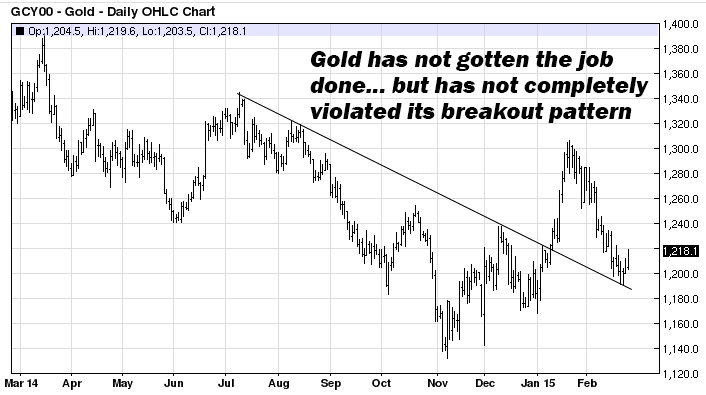
A few weeks back we expressed a bullish turn on gold, as a result of the trend breakout combined with a favorable back- drop of “currency war” and zero or negative rates all around the world. Since then, we have not yet purchased the yellow metal for lack of price action follow-through.
The breakout has sagged and lagged, but has not completely failed just yet. The fly in the ointment remains the threat of a Fed rate hike. With that said, both gold and gold stocks could warrant fair sized starter positions if the current counter-trends break to the upside in short order. If price falls further, we hold fire.
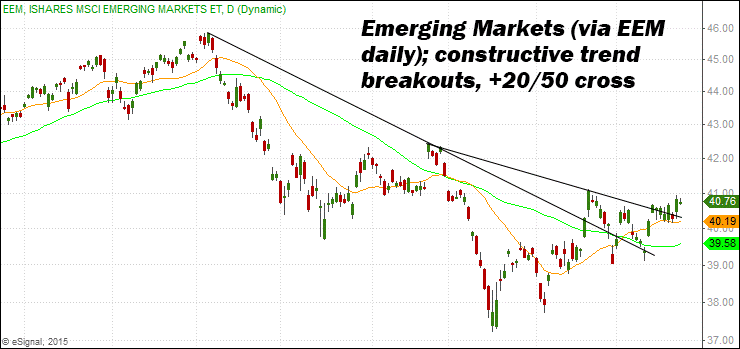
Know that institutional managers are irrational in their need to chase benchmarks; know that these managers need to “do something” with their funds; and know that being bullish is their main job, even in the face of severe medium-term risks. Know the above and you can see why we like iShares MSCI Emerging Markets (ARCA:EEM) for a trade, even with the dangers abounding in markets. With so many global indices overvalued, emerging markets represent one of the last pockets of “value,” on a relative long-term basis, that PMs can justify. As such, emerging markets could see a bull trend (albeit false in our view) in the coming weeks and months, as markets enjoy a reprieve from the euro crisis (Greece has a few more months yet) and mild concerns over Federal Reserve rate hikes are brushed off as tomorrow’s worry…
Similar logic applies to energy stocks, where we are willing to get long for a trade. Both the SPDR Energy Select Sector Fund (ARCA:XLE) and FirstTrust ISE-Revere Natural Gas (NYSE:FCG) now display bullish patterns, as shown via XLE below, and it is easy to see how bottom pickers (Oh bottom pickers! We find you oh so short-sighted and kind of dumb!) could easily get happy slappy about energy stock valuations these next few months.
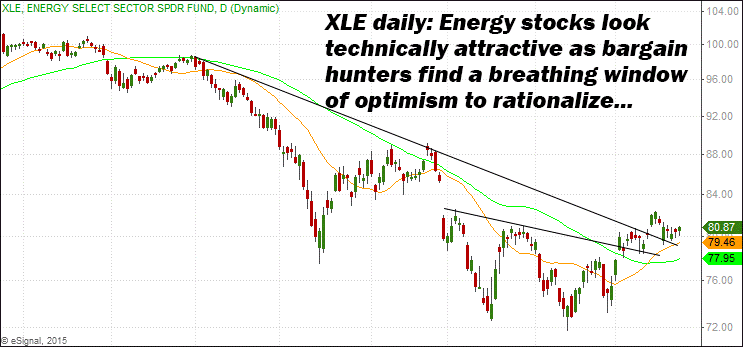
Switching to currencies, dollar/yen (USDJPY) has potential to be a “sleeper trade” of 2015 – a source of big profits that not many are paying attention to. We drew a large chunk of our 2014 profits from dollar/yen, and USDJPY remains one of our larger forex positions. The potential for another upside run is helped by the fact that a weakening yen is generally a “risk on” phenomenon, now aided by desperation from Prime Minister Abe and the BOJ to get “Abenomics” moving.
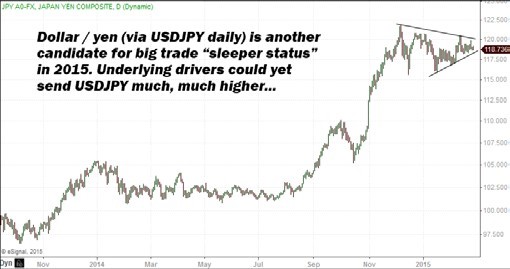
And finally, we still quite like the short side of utilities, which became a massively crowded trade as a result of perpetual ZIRP (zero interest rate policy) and a lack of alternatives. We just have zero respect, if not negative respect, for those money managers who blindly piled into utilities as a proxy for cash with a little bit of yield. The combined historic levels of overvaluation, rate hike fears, and capital rotation potential (cash flowing into other opportunities) could all combine for a big, nasty, free-fall drop in SPDR Select Sector - Utilities (NYSE:XLU). We have a solidly sized short on and will seek the opportunity to build on it, and possibly pyramid aggressively, if utes follow through to the downside. This one could be another “sleeper” for big profits in 2015…
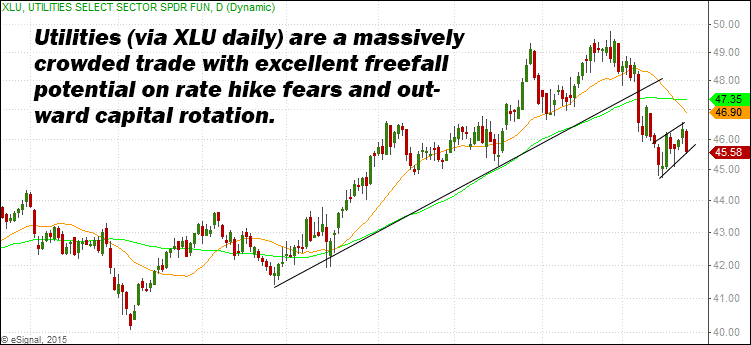
Disclosure: This content is general info only, not to be taken as investment advice. Click here for disclaimer
